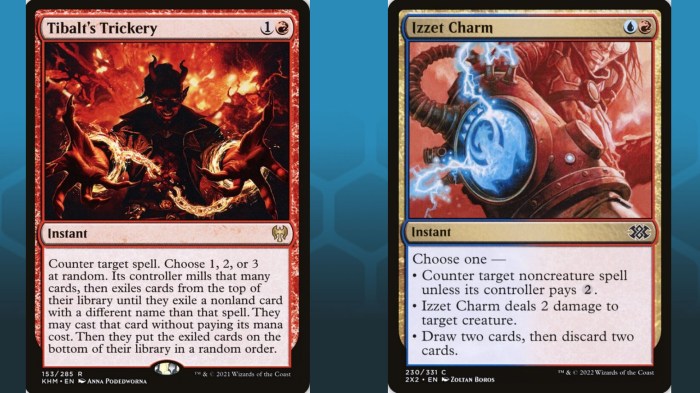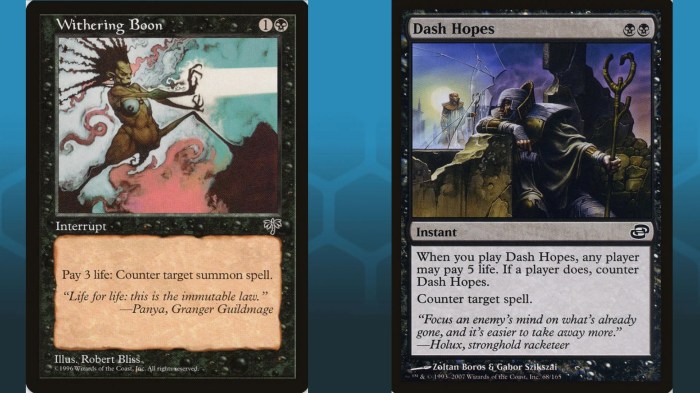MTG counter target spells are a powerful tool in Magic: The Gathering that can disrupt your opponents’ plans and gain you a significant advantage. Whether you’re a new player or a seasoned veteran, understanding how to use counter target spells effectively is essential for success.
In this guide, we’ll explore the basics of counter target spells, including their mechanics, strategies, and role in different formats. We’ll also provide examples of some of the most notable counter target spells in the game.
Overview of MTG Counter Target Spell
Counter target spells are a type of card in Magic: The Gathering that allow players to cancel other spells. They are a powerful tool that can be used to disrupt opponents’ strategies and protect your own. There are many different types of counter target spells, each with its own unique effects and mana cost.
Some of the most common types of counter target spells include:
- Hard counters: These spells can counter any spell, regardless of its mana cost or target. They are typically the most expensive type of counter target spell, but they can be very effective against powerful spells.
- Soft counters: These spells can only counter spells that meet certain criteria, such as a specific mana cost or target type. They are typically less expensive than hard counters, but they can be less versatile.
- Conditional counters: These spells can only counter spells if certain conditions are met, such as if the opponent has a certain number of cards in their hand or if the spell is targeting a specific type of permanent. They can be very powerful if the conditions are met, but they can also be less effective if the conditions are not met.
Mechanics of MTG Counter Target Spell

Counter target spells are played during the opponent’s turn, after they have cast a spell. The player who is casting the counter target spell must pay its mana cost and then target the spell they wish to counter. The spell will be countered if it meets the criteria of the counter target spell.
If the spell does not meet the criteria, it will resolve as normal.
There are a few important things to keep in mind when using counter target spells. First, they can only be used to counter spells. They cannot be used to counter other types of cards, such as creatures or artifacts.
Second, counter target spells must be played at the correct time. If they are played too early, they will not be able to counter the spell. If they are played too late, the spell will have already resolved.
Finally, counter target spells can be countered themselves. This means that it is possible for both players to counter each other’s spells in a never-ending loop. This is known as a “counterspell war”.
Strategies for Using MTG Counter Target Spell
Counter target spells can be a very effective tool in Magic: The Gathering. They can be used to disrupt opponents’ strategies, protect your own creatures and permanents, and even win games. Here are a few tips for using counter target spells effectively:
- Use them sparingly: Counter target spells are a powerful tool, but they should not be used indiscriminately. It is important to save them for the most important spells, such as those that could win the game for your opponent.
- Be aware of your opponent’s deck: If you know what your opponent is playing, you will be able to better anticipate the spells they are likely to cast. This will help you to decide which counter target spells to keep in your hand.
- Don’t be afraid to bluff: Sometimes, it can be effective to bluff that you have a counter target spell in your hand. This can force your opponent to play around it, which can give you an advantage.
Examples of MTG Counter Target Spell

| Name | Mana Cost | Effect |
|---|---|---|
| Counterspell | UU | Counter target spell. |
| Mana Drain | XU | Counter target spell. Mana Drain deals damage to its controller equal to its mana cost. |
| Stifle | 0 | Counter target activated ability. |
| Dispel | WU | Counter target instant or sorcery spell. |
| Negate | 1U | Counter target noncreature spell. |
Role of MTG Counter Target Spell in Different Formats

Counter target spells are a staple in many Magic: The Gathering formats. They are particularly important in formats where there are a lot of powerful spells, such as Legacy and Vintage. In these formats, counter target spells can be used to keep opponents from casting their most powerful spells and winning the game.
In other formats, such as Standard and Modern, counter target spells are less common. This is because there are fewer powerful spells in these formats, and it is therefore less important to be able to counter them.
However, counter target spells can still be useful in these formats, especially in sideboard against decks that rely heavily on spells. For example, in Standard, a deck that is weak to control decks may sideboard in a few counter target spells to help protect itself from counterspells and other disruptive spells.
Quick FAQs: Mtg Counter Target Spell
What is a counter target spell?
A counter target spell is a spell that can be used to counter another spell, preventing it from resolving. This can be done by paying the counter spell’s mana cost and targeting the spell you wish to counter.
What are the different types of counter target spells?
There are two main types of counter target spells: hard counters and soft counters. Hard counters can counter any spell, while soft counters can only counter certain types of spells, such as creature spells or noncreature spells.
When can I cast a counter target spell?
You can cast a counter target spell at any time during your opponent’s turn, before the spell you wish to counter resolves.
What are some tips for using counter target spells effectively?
Here are a few tips for using counter target spells effectively:
- Save your counter target spells for key spells that could swing the game in your opponent’s favor.
- Don’t be afraid to use your counter target spells early in the game to disrupt your opponent’s mana base or prevent them from casting key spells.
- Be aware of your opponent’s deck and the types of spells they are likely to cast. This will help you decide which counter target spells to keep in your hand.
